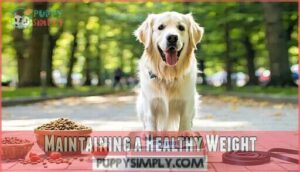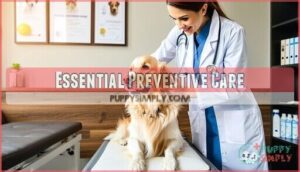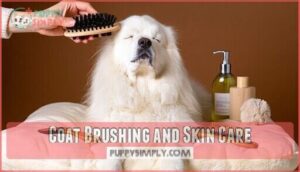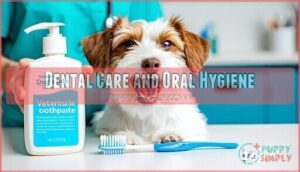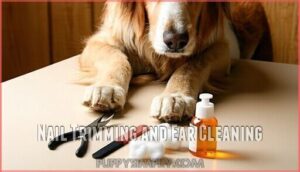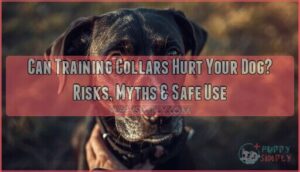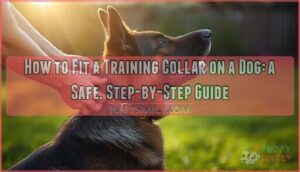This site is supported by our readers. We may earn a commission, at no cost to you, if you purchase through links.

Regular vet visits verify current vaccinations against distemper, parvovirus, and rabies. Maintain ideal weight through body condition scoring—you should feel ribs with minimal fat covering.
Daily tooth brushing prevents gum disease, while weekly nail trims and ear cleaning keep your pup comfortable. Don’t forget flea and tick prevention year-round.
Getting these basics right sets your dog up for a healthy life, and there’s plenty more you can do to help them thrive.
Table Of Contents
- Key Takeaways
- Optimal Nutrition for Dogs
- Maintaining a Healthy Weight
- Essential Preventive Care
- Grooming and Hygiene Tips
- Exercise, Enrichment, and Safety
- Frequently Asked Questions (FAQs)
- What are some common signs of dental problems in dogs?
- What are some potential risks of not providing regular exercise for my dog?
- Are there any specific foods that I should avoid feeding my dog?
- How often should I bathe my dog?
- What human foods are toxic to dogs?
- When should I spay or neuter my pet?
- How do I introduce dogs to children safely?
- What signs indicate my dog needs immediate care?
- Conclusion
Key Takeaways
- You’ll need to feed your dog the right nutrition for their life stage—puppies require 22.5% protein, while adults need at least 18% protein minimum. Keep your dog at a healthy weight by checking their body condition regularly—you should easily feel their ribs without pressing hard. Stay current with core vaccinations like distemper, parvovirus, and rabies, plus maintain year-round flea and tick prevention. * Brush your dog’s teeth daily and trim their nails weekly to prevent dental disease and keep them comfortable.
Optimal Nutrition for Dogs
Good nutrition is everything for your dog’s health. It affects their energy, immune system, and overall well-being in ways that might surprise you.
Working with your veterinarian to select the right diet for your dog’s age, breed, and health status ensures they receive balanced nutrition without unnecessary supplements.
Choosing a Balanced Diet
Finding the right dog food means having a chat with your vet about what’ll work best for your specific pup.
Good dog nutrition comes down to knowing what your dog actually needs – and that depends on their age, breed, and any health issues they might have.
Smart feeding means planning meals around whatever dietary restrictions your furry buddy deals with.
Nutritional Needs by Life Stage
Throughout your dog’s journey from puppy to senior, you’ll need to adjust their diet like shifting gears in a car. Different life stages require specific nutrition profiles to sustain peak health and development.
Understanding a dog’s nutritional needs is vital for their overall health.
- Puppy Feeding: Puppies require 22.5% protein and elevated fat content to fuel rapid growth
- Adult Diets: Adult dogs need 18% minimum protein for maintenance with balanced energy
- Senior Nutrition: Older dogs benefit from fewer calories and more antioxidants
- Breed Specifics: Large breeds need controlled calcium to prevent joint issues
- Dietary Changes: Transition at 12 months when growth stops
Supplements and Special Diets
Most healthy dogs don’t need dietary additives if you’re feeding quality food. However, custom diets become necessary when food allergens trigger reactions or health conditions require vitamin therapy. Your vet might recommend nutrient supplements for joint health, skin issues, or digestive problems.
| Supplement Type | Common Uses |
|---|---|
| Joint Assistance | Arthritis, mobility issues |
| Digestive Enzymes | Food sensitivities, upset stomach |
| Omega-3 Fatty Acids | Coat health, inflammation |
Talk to your vet before starting any supplements to make sure they’re right for your dog.
Maintaining a Healthy Weight
You can’t just eyeball your dog’s weight and hope for the best. Keeping your pup at a healthy weight requires checking their body condition regularly and controlling portion sizes to prevent joint damage and health problems.
Body Condition Scoring (BCS)
Understanding your dog’s body condition helps prevent pet obesity and maintains canine fitness. The body condition scoring system evaluates fat coverage and muscle tone to determine if your furry friend falls within a healthy weight range.
Here’s how to assess your dog’s body condition:
- Feel the ribs – You should easily locate them without pressing hard
- Check the waist – Look for a visible tuck when viewing from the side
- Examine from above – Notice an hourglass shape behind the ribs
- Assess fat coverage – Minimal fat should cover the ribs and spine
- Monitor energy levels – Healthy dogs maintain good stamina and mobility
This body fat analysis aids effective weight management and obesity prevention strategies.
Portion Control and Feeding Schedules
Your dog’s success with portion control starts with understanding meal frequency and feeding guides. Puppies need multiple daily meals, while adults thrive on consistent schedules. Use manufacturer feeding guides as starting points, then adjust portion sizes based on your dog’s response and activity level.
| Life Stage | Daily Meals |
|---|---|
| 8-12 weeks | 4 meals |
| 3-6 months | 3 meals |
| 6-12 months | 2 meals |
| Adult dogs | 1-2 meals |
| Senior dogs | 2 smaller meals |
Essential Preventive Care
You’ll protect your dog’s health by staying current with vaccinations and scheduling regular vet visits that catch problems early.
Preventive care also includes consistent flea, tick, and parasite control that keeps your furry friend comfortable year-round.
Core and Elective Vaccinations
Following weight management, vaccines protect your dog from serious diseases. Core vaccines are required for all dogs and include distemper, adenovirus, parvovirus, and rabies. Elective shots like kennel cough depend on your dog’s lifestyle.
Puppy vaccinations start around 8 weeks through 16 weeks, with booster shots every 1-3 years based on veterinary advice and guidance. It’s vital to consult vaccine guidelines to determine the best vaccination plan for your dog.
Routine Veterinary Check-ups
Prevention beats treatment every time when it comes to your dog’s health. Schedule annual vet visits to build a complete medical history and keep vaccinations up to date.
These checkups cover vital health screenings, dental exams, and discussions about parasite prevention. Your vet will offer personalized advice based on your dog’s unique needs.
Staying on top of regular vet care keeps your dog healthy through preventive medicine that catches problems early.
Flea, Tick, and Parasite Prevention
Beyond regular vet visits, you’ll need thorough flea and tick prevention to protect your dog from disease-carrying pests. These tiny invaders can transmit serious illnesses like Lyme disease and Rocky Mountain spotted fever.
Here’s your parasite control action plan:
- Apply monthly flea control treatments year-round
- Use tick prevention products during peak seasons
- Check your dog’s coat daily for hitchhiking pests
- Maintain your yard with pest management strategies
- Discuss parasite medicine options with your veterinarian
Grooming and Hygiene Tips
Regular grooming keeps your dog’s coat healthy and helps you spot potential health problems before they become serious issues.
You’ll need to brush their coat, clean their teeth daily, trim their nails weekly, and clean their ears with vet-approved products to maintain proper hygiene.
Coat Brushing and Skin Care
Regular grooming sessions strengthen your bond while keeping your dog’s coat healthy and beautiful. Proper brushing techniques prevent hair matting and help with shedding control—your slicker brush and metal comb are your best allies.
Watch for skin allergies during grooming, as coat conditioning reveals early signs of irritation. Canine care includes selecting appropriate tools for your dog’s specific coat type.
Dental Care and Oral Hygiene
Your dog’s breath shouldn’t clear a room. Daily tooth brushing prevents gum disease and keeps bacteria from entering their bloodstream.
Here’s your dental care game plan:
- Brush dog teeth daily with pet-safe toothpaste
- Offer dental chews to reduce plaque buildup
- Schedule professional cleanings with your vet
- Monitor for bad breath or swollen gums
Good oral health protects your pup’s heart, liver, and kidneys too.
Nail Trimming and Ear Cleaning
Your dog’s nails and ears need weekly attention to prevent problems. Trim nails using proper grooming tools and techniques—you’ll hear a click when cutting through the nail.
Watch for ear infection signs like odor or discharge. Use vet-approved cleaning solutions to gently wipe ear canals.
Regular nail care and ear cleaning keep your pet comfortable and healthy.
Exercise, Enrichment, and Safety
Your dog’s physical activity and mental stimulation needs vary based on their breed, age, and health status, but most healthy dogs require 30 to 60 minutes of daily exercise to maintain peak well-being.
You’ll also need to prepare for emergencies by establishing a relationship with a veterinarian and keeping a first aid kit accessible for prompt care when unexpected situations arise.
Tailoring Exercise to Breed and Age
You’ll need to match your dog’s exercise routine to their breed and age for ideal canine fitness levels. A 5-month-old puppy would benefit from 25 minutes of exercise twice daily, while dogs need anywhere from 30 minutes up to 2 hours of exercise every day depending on their breed.
High-energy breeds require breed-specific exercise through dog sports training, while senior dogs need gentler, age-based activities. Daily outdoor play prevents destructive behaviors.
Mental Stimulation and Puzzle Games
Physical exercise alone won’t keep your furry friend satisfied. Mental games and puzzle toys provide brain training that’s just as important as daily walks.
Interactive play through food puzzles challenges cognitive function while preventing boredom-related behavioral issues. Canine enrichment activities during rainy day play time help tired minds, creating well-balanced dogs who are happier and calmer at home.
Emergency Preparedness and First Aid
Building an Emergency Kit with pet first aid essentials and disaster planning helps protect your furry friend when the unexpected happens.
Stock gauze, bandages, thermometer, and your vet’s contact info alongside poison control numbers for veterinary emergencies.
Preparation ensures you’re ready to provide canine health assistance during crises, safeguarding pet safety.
Frequently Asked Questions (FAQs)
What are some common signs of dental problems in dogs?
Watch for bad breath that smells like garbage, yellow or brown tartar buildup on teeth, red or swollen gums, and excessive drooling.
You’ll also notice difficulty chewing food or pawing at their mouth frequently.
What are some potential risks of not providing regular exercise for my dog?
Without regular exercise, your dog faces obesity, joint problems, destructive behavior, anxiety, and weakened muscles. Sedentary dogs often develop diabetes, heart disease, and shortened lifespans while becoming restless indoors.
Are there any specific foods that I should avoid feeding my dog?
You’ll want to steer clear of chocolate, grapes, onions, macadamia nuts, xylitol (artificial sweetener), and avocados.
These common foods can cause serious health problems, from digestive upset to organ failure, so keep them out of reach.
How often should I bathe my dog?
Coincidentally, bath time arrives right when you’re wondering about it. Most dogs can be bathed once a month, though your dog’s breed will be a huge determining factor. Use your nose—if they smell funky, it’s time.
What human foods are toxic to dogs?
Chocolate, grapes, onions, cherries, macadamia nuts, and salty foods pose serious dangers to your dog’s health.
Avocados contain persin toxin, while garlic and xylitol sweetener can also cause severe poisoning.
Contact your vet immediately if ingestion occurs.
When should I spay or neuter my pet?
Discuss spaying and neutering timing with your veterinarian based on your dog’s breed and size.
Small breeds usually get spayed or neutered at 6-9 months, while larger breeds may wait until 12-18 months.
How do I introduce dogs to children safely?
Regarding mixing kids and canines, slow and steady wins the race. Let children sit quietly and allow your dog to approach them first, while maintaining constant adult supervision throughout every interaction.
What signs indicate my dog needs immediate care?
Watch for difficulty breathing, seizures lasting over three minutes, severe bleeding, pale gums, sudden bloating, or collapse—these require immediate emergency veterinary care.
Conclusion
Your dog’s health isn’t rocket science—it just takes showing up every day, like any relationship worth having.
Cover the basics: quality food, routine vet checkups, keeping them at a healthy weight, and staying on top of grooming. Master these four things, and you’re already ahead of most pet owners.
Here’s the thing—those little daily habits you build now save you from heartbreak and hefty vet bills down the road. Keep up with the basics, and you’ll likely have many more years together.
Daily habits you build now prevent heartbreak and expensive vet bills later—stick to the basics for more healthy years together
- https://www.petfoodindustry.com/news-newsletters/pet-food-news/news/15742012/2025-pet-food-ingredient-report-reveals-517b-market-rising-demand-for-premium-nutrition
- https://wildearth.com/blogs/dog-knowledge/surprising-stats-for-dog-parents
- https://americanpetproducts.org/news/the-american-pet-products-association-appa-releases-2025-dog-cat-report
- https://fortmyersvet.com/pet-nutrition/
- https://therapydia.com/exercise-guidelines-for-you-and-your-petby-tammara-moore-physical-therapis/




